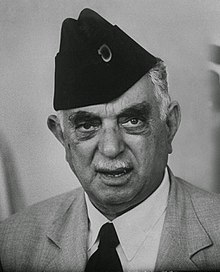This article needs additional citations for verification. (March 2008) |
Nuri al-Said | |
|---|---|
نوري باشا السعيد | |
 Nuri al-Said in 1957 | |
| Prime Minister of Iraq | |
| In office 3 March 1958 – 18 May 1958 | |
| Monarch | Faisal II |
| Preceded by | Abdul-Wahab Mirjan |
| Succeeded by | Ahmad Mukhtar Baban |
| In office 4 August 1954 – 20 June 1957 | |
| Monarch | Faisal II |
| Preceded by | Arshad al-Umari |
| Succeeded by | Ali Jawdat Al-Ayyubi |
| In office 15 September 1950 – 12 July 1952 | |
| Monarch | Faisal II |
| Regent | Prince Abdullah |
| Preceded by | Tawfiq al-Suwaidi |
| Succeeded by | Mustafa Mahmud al-Umari |
| In office 6 January 1949 – 10 December 1949 | |
| Monarch | Faisal II |
| Regent | Prince Abdullah |
| Preceded by | Muzahim al-Pachachi |
| Succeeded by | Ali Jawdat Al-Ayyubi |
| In office 21 November 1946 – 29 March 1947 | |
| Monarch | Faisal II |
| Regent | Prince Abdullah |
| Preceded by | Arshad al-Umari |
| Succeeded by | Salih Jabr |
| In office 10 October 1941 – 4 June 1944 | |
| Monarch | Faisal II |
| Regent | Prince Abdullah |
| Preceded by | Jamil al-Midfai |
| Succeeded by | Hamdi al-Pachachi |
| In office 25 December 1938 – 31 March 1940 | |
| Monarchs | Ghazi I Faisal II |
| Regent | Prince Abdullah |
| Preceded by | Jamil al-Midfai |
| Succeeded by | Rashid Ali al-Gaylani |
| In office 23 March 1930 – 3 November 1932 | |
| Monarch | Faisal I |
| Preceded by | Naji al-Suwaydi |
| Succeeded by | Naji Shawkat |
| Personal details | |
| Born | Nuri Pasha al-Said December 1888 Baghdad, Baghdad Vilayet, Ottoman Empire |
| Died | 15 July 1958 (aged 69) Baghdad, Arab Federation |
| Cause of death | Gunshot wounds |
| Political party | Covenant Party, Constitutional Union Party (Iraq) |
Nuri Pasha al-Said CH (Arabic: نوري السعيد; December 1888 – 15 July 1958) was an Iraqi politician during the Mandatory Iraq and the Hashemite Kingdom of Iraq. He held various key cabinet positions and served eight terms as Prime Minister of Iraq.
From his first appointment as prime minister under the British Mandate in 1930, Nuri was a major political figure in Iraq under the monarchy. The 1930 Anglo-Iraqi Treaty granted Britain permanent military prerogatives in Iraq, but also paved the way for the country's nominal independence and entry as a member of the League of Nations in 1932. Nuri was forced to flee the country after the 1941 Iraqi coup d'état which brought a pro-Nazi government to power, but following a British-led intervention he was re-installed as prime minister.
During the early fifties, Nuri's government negotiated a fifty-fifty profit-sharing agreement on royalties with the Iraq Petroleum Company as oil began to play a significant role in the Iraqi economy. The agreement, along with the establishment of the Iraqi Development Board, provided for a series of ambitious schemes and projects to foster comprehensive economic growth in Iraq, and the private sector came to dominate the country's economic activity. However, the working conditions of the poor remained poorly addressed, which further contributed to the growth of anti-monarchist sentiment. The formation of the Baghdad Pact in 1955 exacerbated discontent in the country.
A controversial figure throughout most of his career, Nuri was deeply unpopular amongst several fragments of Iraqi society by the end of 1950s. His political views, regarded as a blend of Iraqi nationalism, Conservatism, pro-Western sentiment, anti-Communism, and anti-Nasserism, were believed by his detractors to have failed in adapting to the country's changed social circumstances. A coup d'état took place in July 1958 and led to the overthrow of the Hashemite monarchy. Nuri attempted to flee the country but was captured and killed.